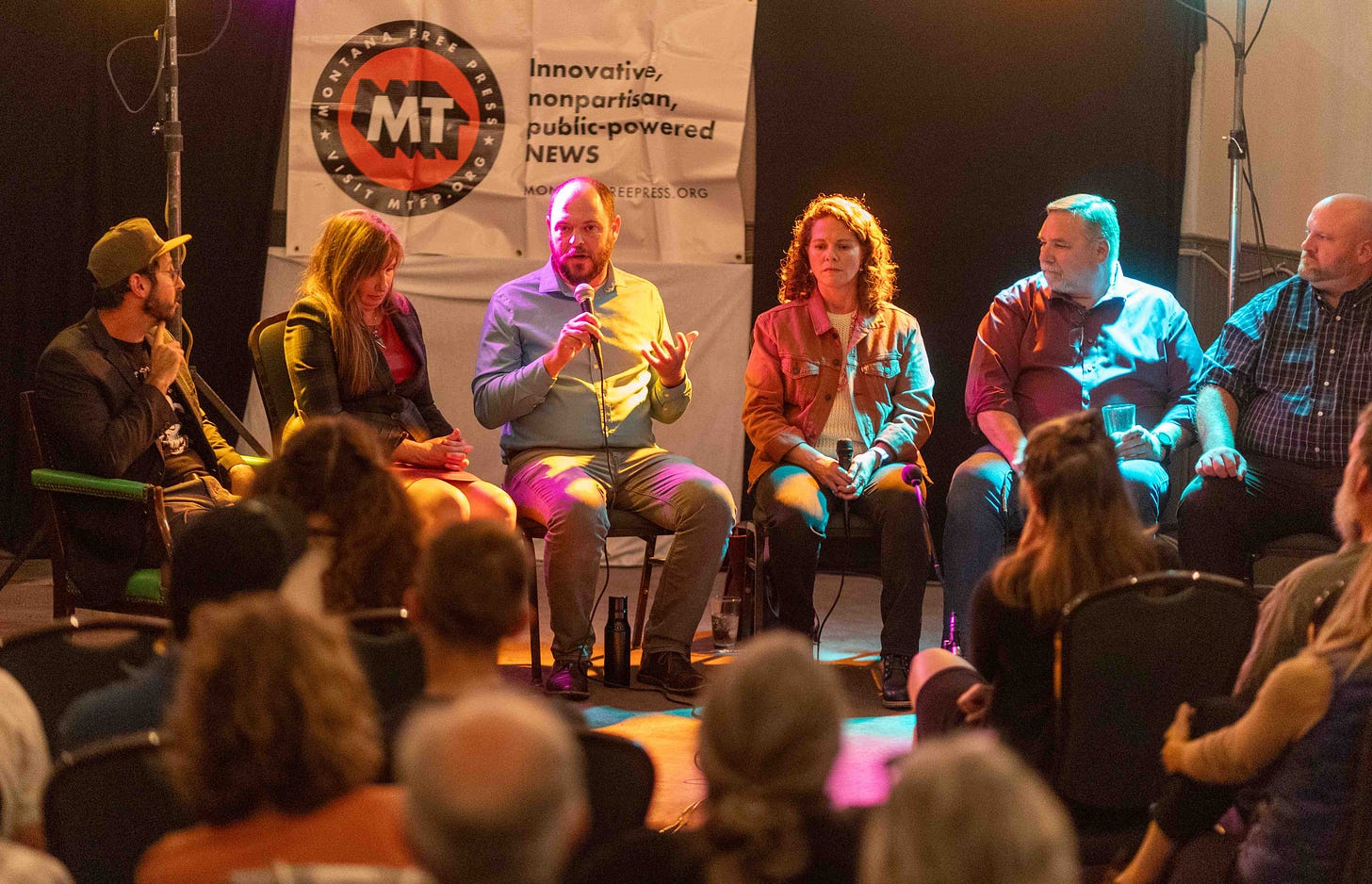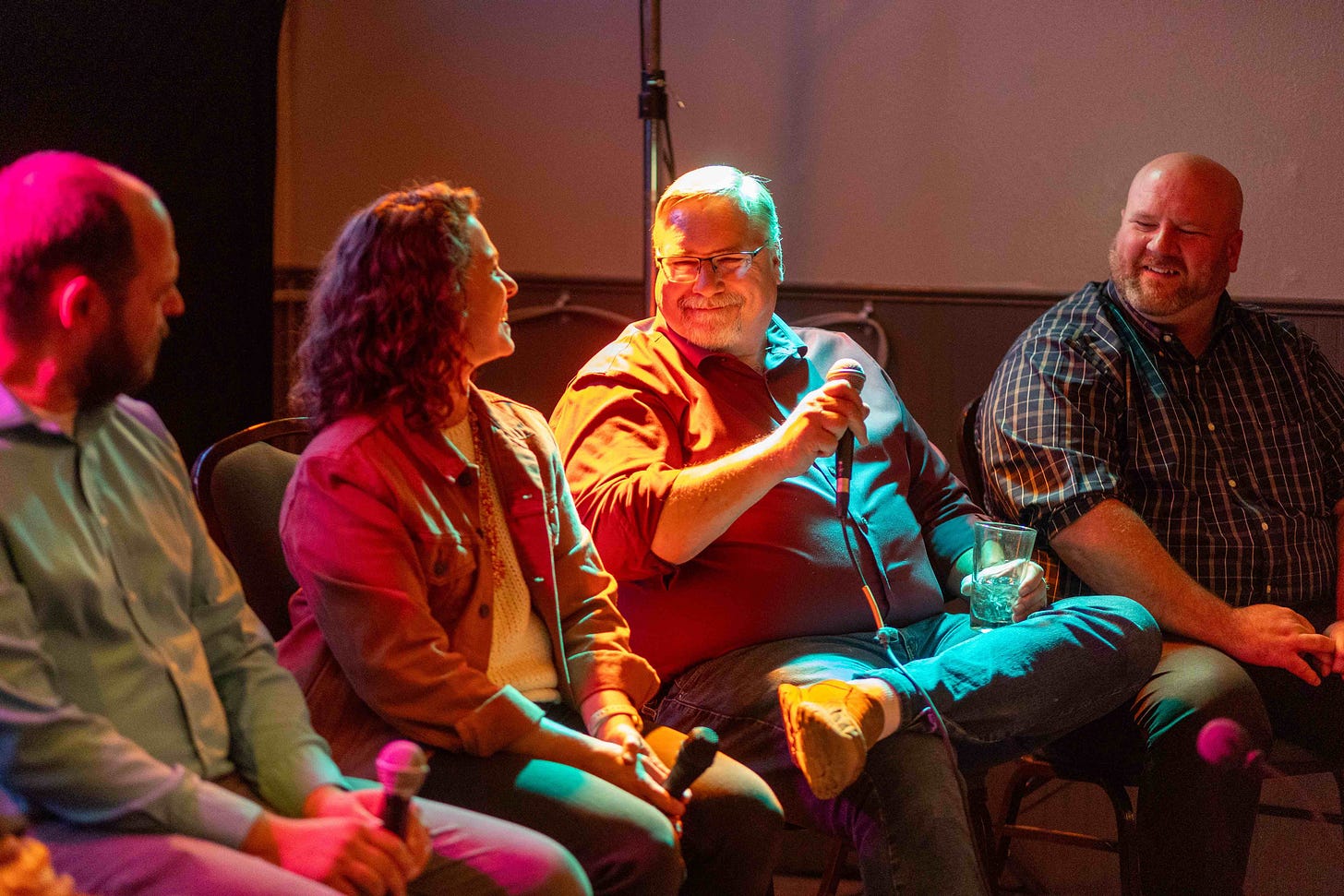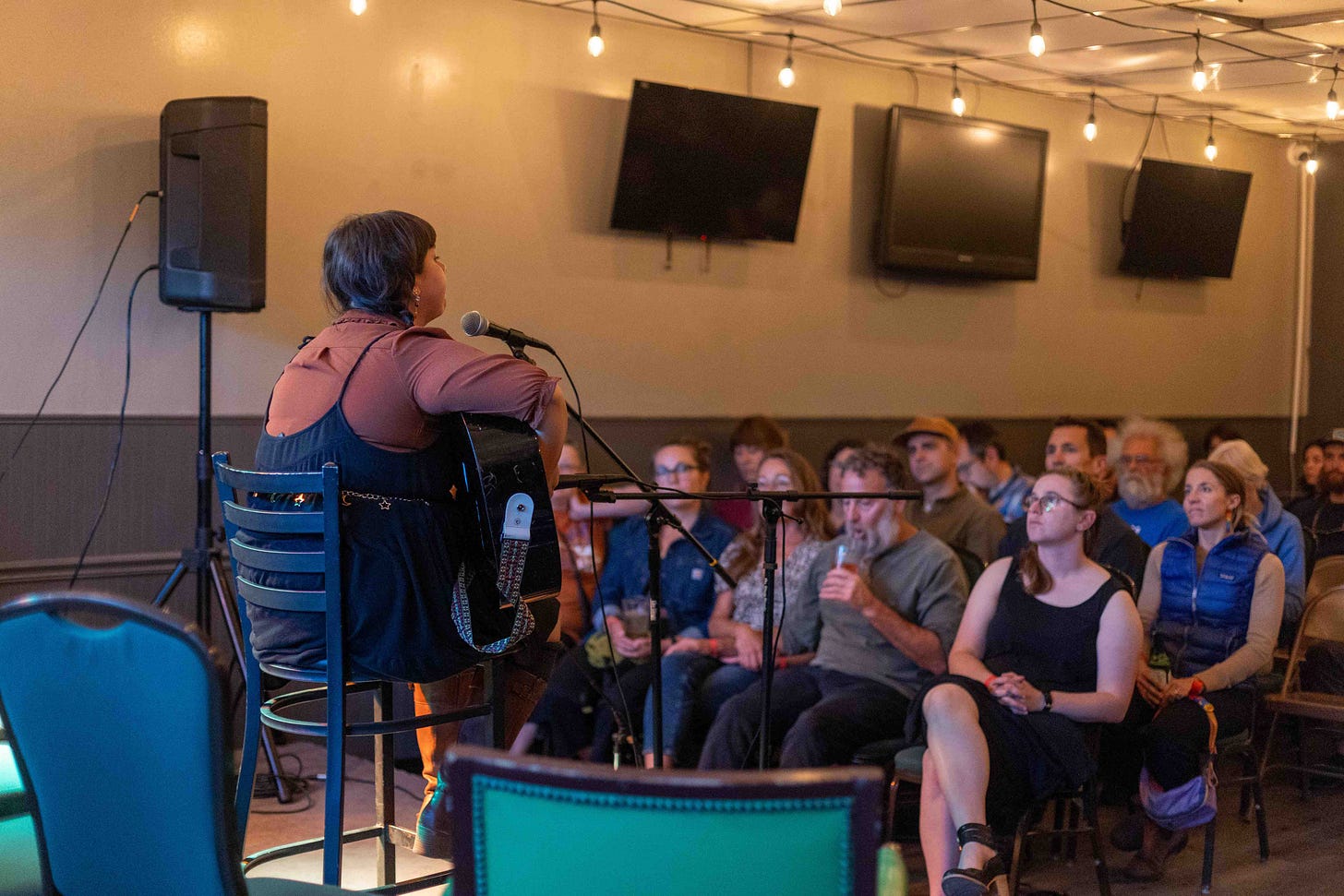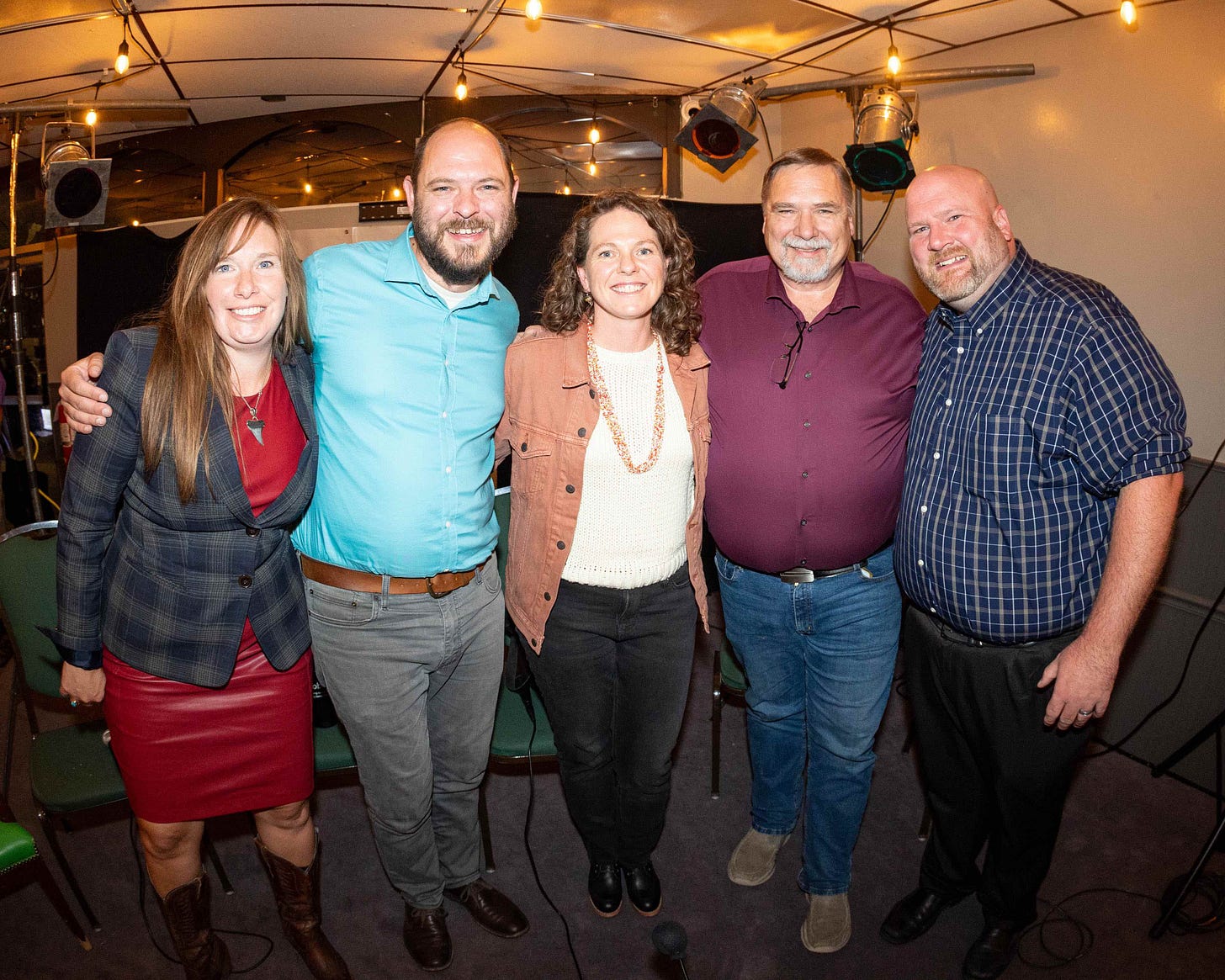Highlights from our Missoula mayoral candidates forum!
We talk psychedelic de-crim, budget cuts, the lack of diversity on City Council, the Johnson Street shelter and more.

Welcome to Big Sky Chat House— a newsletter of candid conversations with movers and shakers in Montana.
If you found this email in your Promotions folder, please move it to your Primary inbox. That will make it easier to find down the road, and teach Gmail to send it to other subscribers’ Primary inboxes as well.
MAN. I’m still on cloud nine from Thursday evening’s Missoula mayoral candidates’ forum. We got heady. We got thoughtful. We got a little bit weird.
A million thanks to the VFW for hosting us, to Montana Free Press for their generous sponsorship, to Dylan Running Crane for her brilliant and captivating music, to Daisy Chain for being the coolest production team in the Garden City, to the candidates themselves and to our wonderful, lively audience!
For those who may need a refresher, five candidates are running in this week’s primary election: consultant Brandi Atanasoff, Homeword Executive Director Andrea Davis, Mayor Jordan Hess, project manager Shawn Knopp and City Council member and realtor Mike Nugent. The two candidates who receive the most votes on Tuesday will go on to run in this November’s general election.
The six of us covered a lot of ground: decriminalizing psychedelic drugs, a lack of diversity in City Council, how to trim the city budget, the Johnson Street shelter, tenants’ rights and much more.
Below, you’ll find a highlight reel of sorts. The candidates didn’t speak in the same order for each question; the forum offered an informal opportunity for conversation, and there was no time limit for their responses.
Enjoy, and feel free to let us know what you think in the comments below!
** Don’t forget—the election is THIS TUESDAY, September 12! If you plan to vote, but haven’t done so, DO NOT put your ballot in the mail. Take it to the Elections Center at 140 N. Russell Street. **
On decriminalizing psychedelic substances, which City Council attempted, and failed to do, last year.
Mayor Jordan Hess: In Montana code there's a section called “powers denied.” There are things that cities can't do. And then there are some kinds of gray zones in the middle [regarding] things that the code is silent on.
One of the things that I was concerned about when that came about—and I am supportive of evidence-based therapeutic uses of alternative medicines; I'm supportive of reforming our criminal justice system—was that the city didn't have a role in directing police to not enforce a state law. And so I encouraged the sponsors [Council members Daniel Carlino and Kristen Jordan] to work at the legislative level; I think that's the right path.
Council member Mike Nugent: I thought that the hot wing contest at our last forum was unique, but leading with mushrooms is not something I saw coming.
I'm very much a ‘live and let live’ person. We asked a lot of questions during that [discussion on Carlino’s resolution], and one of the things we learned is that the Missoula Police Department has not done a direct charge for this crime in quite a while. There had been a couple citations tied to other arrests, but our understanding at the time was that it was not something that the police department was actively going out and searching for.
I don't have concerns about a lot of people making individual decisions, but if there's no science that we can point to to make sure that there's a safe level on what consumption is or things like that, as a local government, we've got to be very careful on just removing something where maybe we don't have the ability to track all the science in the way that other people do.
Shawn Knopp: I think I'm the oldest one up here. I grew up in the seventies and eighties, and so I experimented (laughs). I didn't inhale. I don't think we can locally make that legal.
Andrea Davis: I grew up in Kalispell, and there's a noted cultural difference, I would say, with Missoula's police force and other communities in the state; I do believe we have a culture of acceptance, for the most part. If we're not seeing a lot of arrests associated with something that's still illegal, I think we have to evaluate how far do we push against something that is still not permitted in the state.
Brandi Atanasoff: I'm a big fan of alternative therapies. It is huge. We are cutting edge here in Missoula. The best way to handle a lot of our controversial topics that are not supported at [the state level] is to create educational opportunities for information to be shared, for people's minds to be opened, for people to see things.
[Note: Reached for comment, Carlino argued that the resolution’s framing—which bars city funds to be used to continue the prohibition of some psychedelics—enables it to circumvent state law. Carlino also noted that the late city attorney Jim Nugent had signed off on the resolution’s language.]
On City Council candidate Gwen Nicholson’s argument in this newsletter that a lack of diversity on city council inhibits conversations that could lead to significant changes in Missoula.
Nugent: I think sometimes council lives in a bubble, because it's actually fairly limited who has the flexibility in their life to do it. It's basically people who have financial flexibility or a very understanding boss, or they're retired or they’re a stay-at-home spouse or something of that nature. You do not get a lot of people who are just everyday working Missoulians or people of lower socio-economic groups.
I believe absolutely that sometimes the conversations we're having in that room around the horseshoe are all coming from very dedicated, passionate public servants. But I don't know that it always represents a full spectrum of Missoula.
Davis: I agree with Gwen's assertion that having greater diversity on council would encourage different conversations and produce different outcomes for our community. There will be an opportunity in the coming years for [residents] to vote on the opportunity to put together a committee to examine the city charter, which is basically how our city government is structured. Maybe that's the opportunity for us to take a look at some things: [how] we’re currently structured and the time of day that we meet.
Mayor Hess: I've been on councils where the vote was always 12 to zero. And those couple years were the least productive in terms of having discussions that were meaningful, that were deep, that were nuanced, that brought additional viewpoints to the table. We're absolutely at our best when we have a diversity of lived experiences and a diversity of viewpoints. It is not easy to serve on the city council with a job that is kind of paid a quarter time-ish and interrupts your life in certain ways.
We're doing some really interesting work around engagement, and I think that's a piece of this puzzle as well.
One of the worst ways to engage with local government is coming down to a city council meeting on a Monday night. We're really trying to turn that model on its head. So for our code reform process, we've hired an engagement specialist that goes out in the community. Rather than asking people to come to us at the city council, we go to people where they are.
A great example of that was the Midtown masterplan.
[The engagement specialist] tried to solve for issues like a meeting that doesn't have childcare [and results in] someone not being able to come and provide a perspective because they're not able to make it. [The specialist] tried to meet with disadvantaged groups that just don't typically have a voice in the public process and really try to make sure that everyone has a voice in the process.
Atanasoff: There are tons and tons and tons of leaders that want to stand up in our town. It really starts with us as a community just being shoulder to shoulder and being like, “Hey, how are you? Thank you for serving, thank you for speaking up. Have you thought about city council?”
On opportunities to cut the city budget
Nugent: You're probably getting sick of hearing us say it, but our tax system's broken; the way that local governments are funded in Montana is terribly broken. There's over $4 million between ARPA funds and [Missoula Redevelopment Agency] MRA dollars that are funding essential programs [and are going to expire this year.] We're going to have to set priorities and look, unfortunately, at determining how we make tough decisions between programs that people over the years have liked.
I'll give you two examples. There are times where we might rely on a consultant to help us get to an answer that maybe we already know we're going to do. We just need to be a little bit more bold and say, “Hey, we know what we need to do, let's go ahead and do it.” Another example of a department that we could take a look at is the cemetery. How do our employment levels there compare to the private cemeteries in town, and what are the services we're offering there and is there a good reason for them?
Mayor Hess: So this [FY 2024] budget was a transparent, open deliberative process. And it began with the work around our strategic plan back in December 2022.
There was a question at the library [candidates’ forum, sponsored by Missoula Democrats], what would you cut? I ultimately wrote a question mark because I've been thinking about what would I cut for years, and I couldn't come up with something on the spot. It's not a simple soundbite answer. The budget process is complicated.
There are certain things that we can't cut, that we have legal obligations around the level of service, that make up a large portion of our budget. And what you're basically left with is parks and streets, and those are both $13 to $14 million budgets. So if you're cutting $3-6 million out of parks or streets, that's not trimming the fat; that is amputating a limb, that is a deep, deep, deep cut of service.
Knopp: Rather than spend a hundred thousand dollars on a [clean energy] consultant, I would love to see green energy money spent on a program helping homeowners and businesses put solar panels on their houses.
Atanasoff: I would cut TIF [tax increment financing]. It definitely seems like there've been some upgrades on other people's properties that have been paid for by our tax dollars. It is really extremely expensive to live in Missoula. We need to be humble. I'm gonna be the person that's gonna say weird shit about TIF.
On the future of the Johnson Street shelter
Davis: We don't have anywhere else [for people] to go right now. We need another location. We need to work hard to find that. In the meantime, we have folks that have very real safety public safety concerns.
There are operating procedures that need to be better articulated in terms of like, what happens if and when somebody does get removed from the shelter? This is a low barrier shelter, and that is best practice because quite frankly, people need a place to go when they are facing substance abuse challenges. As long as they aren't [having] mental and behavioral health challenges, as long as they are not harming somebody, then they need to be able to stay in a safe place.
If they are removed from that shelter, then there should be a protocol that is established with public safety officials and with the police so that the neighborhood does have the opportunity to have that sense of security so folks aren't just released into the neighborhood.
Mayor Hess: We know we need a permanent second shelter and we need to figure out with our provider community who that serves. Is it low barrier? Is it serving transition age youth? Is it serving families with children in MCPS? We need to understand exactly what the need is for the second shelter and where that is located. The one thing I will say is that the biggest tool that we will have to build this shelter outside of philanthropy, is low income housing tax credits.
Nugent: I want to make sure that we have a goal of demolishing that building within three years. Because when we purchased that, Mayor Engen said we wanted to do mixed use and housing that was affordable to people at all income levels. And I think that's a good goal for that neighborhood and that's something we should work towards. That definitely involves the community having a conversation around a long-term shelter and where that's at. Maybe we can do a lower housing tax project that maybe has transitional housing and other things with it.
Knopp: If that area was used for long-term unhoused [people], I would make sure that it had full wraparound transitional housing to go with it. On-site drug treatment, alcohol treatment, mental illness; it all needs to be taken care of at the same time. The problem that I see over at the Poverello on a daily basis is there's people over there that are trying to get their lives back on track, but the people that aren't allowed into Pov are out there doing drugs. They're shooting up heroin right on the street corner. And it's even harder for the people that are trying to get better. It's making it harder on them and prolonging their recovery.
Atanasoff: This isn't just about the Johnson Street Shelter, this is about the fact that we have a massive amount of people that need to stand back up and be okay. And we can't just throw a shelter at it. We all need to stand up and walk next to them. We need to create spaces like yoga in the parks. But creating opportunities for people to get well is really important because people are living on the streets because they are in so much pain that going and trying to act like they're not in pain around other people is too difficult.
On skyrocketing housing prices, and right to counsel for tenants in eviction court
Mayor Hess: I have a really positive housing story when a lot of people don't. My partner and I were longtime renters and were able to buy our house in the pandemic right before things got really crazy from our former landlord. It was a challenge. And, and if it was a challenge for us, being relatively privileged, then it's a challenge for a huge, huge swath of our community. I’m probably the first mayor in a long time with a roommate.
The code reform effort is the single greatest thing we can do to build housing. Our land use code is like the junk drawer in your garage where all of the tools that you need are; if you rummage around in there, you might be able to find them. But our code is decades old. It is it is complication on complication layer upon layer of just simply unnecessary code. So we are going through it. At the end of the day, we're going to emerge with what's called a unified development code.
Two other things: One is an incentive package that we're working on that'll provide incentives for folks who do develop housing that's income qualified. Those could be things like parking reductions or density bonuses or skipping to the front of the building permit queue. Things that could provide meaningful relief and really incentivize people to develop housing in a way that's affordable. And [lastly], really targeted investment through our affordable housing trust fund.
Davis: I too would support right to counsel and I think we can look to drug courts and other eviction courts around the country as a model for how we're ensuring that folks that are having to engage in the eviction process in particular have the ability to participate. Resources are certainly going to be a conversation. How do we make sure that we have the resources for it? This community is resourceful and we have partners like Montana Legal Services that can find ways.
Something that we hear a lot in the public is that the city has no business buying land. I'm gonna tell you that the city does have business buying land, but the city doesn't have any business being a landlord. And the Johnson Street site is a really good example of that. As somebody that is a non-profit, affordable housing developer that uses low income housing tax credits and puts together really big complex projects, it takes a long time to put all of that financing together, let alone then hiring the architect and engineer to design the project and then putting it out to bid and actually getting the project built so it's actually ready for rent. And so land is one of the things that is the most complicated pieces because you have to have it, but it's not generating any income for you.
This conversation has been edited for length and clarity.
Thanks so much for being here. In the meantime, you can always reach me via email, the comment section below, or on the Elon Machine, @SavageLevenson.





Nice recap for someone who couldn’t be there.